#the coddling of the american mind
Text
By: Jonathan Haidt
Published: Dec 22, 2023
[Note: this is post #1 of a pair of posts. The second post gives the text of chapter 3 of The Coddling of the American Mind.]
In the days after the October 7 Hamas attack on Israel, university campuses immediately distinguished themselves as places set apart from the rest of American society—zones where different moral rules applied. Even before Israel began its military response, the loudest voices on campus were not university leaders condemning the attacks and vowing solidarity with their Jewish and Israeli students. Instead, the world saw faculty members and student organizations celebrating the attacks.
Political commentator and Atlantic author David Frum summed up the moral uniqueness of the academy in this tweet, four days after the attack:
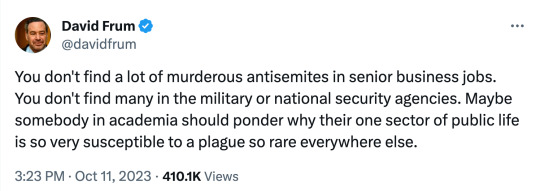
Since then, there have been hundreds of antisemitic incidents on campuses including vandalism of Jewish sites, physical intimidation, physical assault, and death threats against Jewish students, often from other students. The response from university administrators has often been slow, weak, or entirely absent.

[ Image. The scene on the exterior wall of my office building at NYU on the morning of October 17, 2023. NYU students had posted fliers about Israelis kidnapped by Hamas. Other NYU students tore them down. Other NYU students posted more of them. ]
Why is the culture of elite higher education so fertile for antisemitism, and why are our defenses against it so weak? Don’t we have the world's most advanced academic concepts and bureaucratic innovations for identifying hatred of all kinds, even expressions of hatred so small, veiled, and unconscious that we call them “micro-aggressions” and “implicit biases”?
Yes, we do, but it turns out that they don’t apply when Jews are the targets,1 and this was the shocking hypocrisy on display in that Congressional hearing room on December 5. Congresswoman Elise Stefanik asked the President of the University of Pennsylvania “Does calling for the genocide of Jews violate Penn's rules or code of conduct, yes or no?” President Magill was unable to say yes. When the question was asked in various ways to all three presidents, none could say yes. All said variations of “it depends on the context.”
Now, as a social psychologist who studies moral judgment, I’m all for context. Technically, those presidents were correct that students chanting “from the river to the sea” may or may not be advocating killing all the Jews in Israel. Those chanting “globalize the intifada” may or may not be calling for terrorist attacks on Jewish sites around the world. And even if they were, such political speech is protected by the First Amendment unless the speech is made in a context that is likely to incite actual violence, constitutes a “true threat,” or rises to the level of discriminatory harassment. Those three presidents could have said that their universities are bastions of free speech where everyone lives and dies by the First Amendment.
In fact, they tried to say that, and this is why they were so widely pilloried for hypocrisy. Like most elite schools, Harvard, Penn, and MIT have spent the last ten years punishing professors for their research findings and disinviting speakers who questioned the value of DEI. (See The Canceling of the American Mind for dozens of other examples.) As has been widely reported, Harvard and Penn are the top two schools in America for creating terrible speech climates, according to the Foundation for Individual Rights and Expression.
What on earth happened to the academy? As Fareed Zakaria recently asked: How did America’s elite universities go from being “the kinds of assets the world looks at with admiration and envy” just eight years ago, to becoming objects of ridicule today? How did we bungle things so badly?
Greg Lukianoff and I wrote a book that tried to answer that question in 2018, as it was happening.
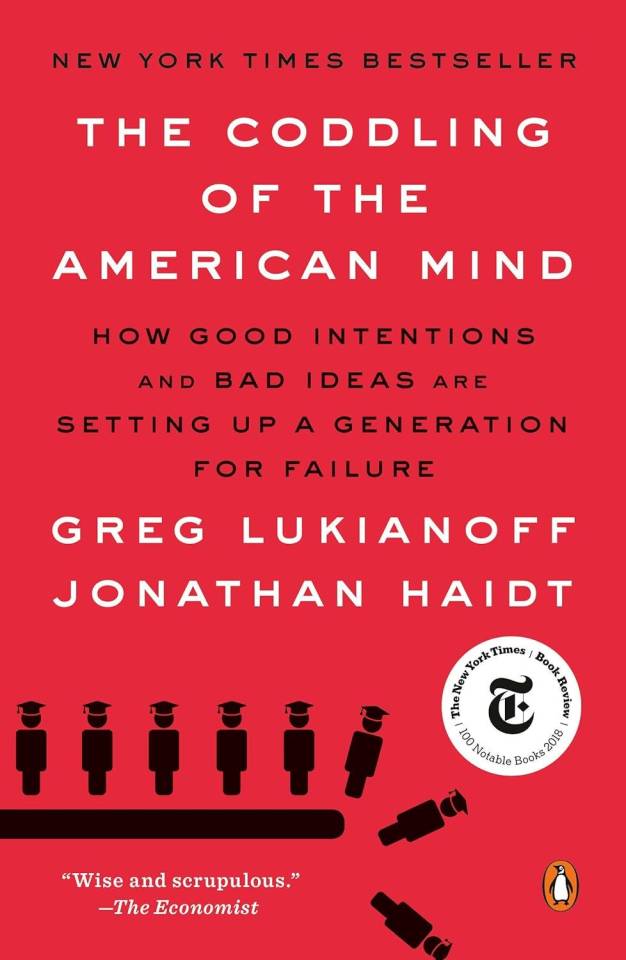
The Coddling of the American Mind tells the story of how American universities lost their collective minds, beginning around 2014 when student demands for protections from speech seemed to appear out of nowhere, including calls for trigger warnings, safe spaces, bias response teams, and mandatory trainings around language use. The students were supported by some faculty members and some administrators, and their combined force pressured many university leaders to accede to their demands even though, privately, many had misgivings.2
The new morality driving these reforms was antithetical to the traditional virtues of academic life: truthfulness, free inquiry, persuasion via reasoned argument, equal opportunity, judgment by merit, and the pursuit of excellence. A subset of students had learned this new morality in some of their courses, which trained them to view everyone as either an oppressor or a victim. Students were taught to use identity as the primary lens through which everything is to be understood, not just in their coursework but in their personal and political lives. When students are taught to use a single lens for everything, we noted, their education is harming them, rather than improving their ability to think critically.
This new morality, we argued, is what drove universities off a cliff. For a while, the descent was gradual, but at Halloween, 2015, in a courtyard at Yale, the free fall began. Students and administrators espousing the new morality demanded reforms at Yale and, over the next few months, at dozens of other schools. With a few exceptions, university leaders did not stand up to the new morality, critique its intellectual shortcomings, or say no to demands and ultimatums.
You can see the fall of higher ed in data from Gallup. The figure below shows that as recently as 2015, most Democrats and even most Republicans had high confidence in higher education as an institution. (Independents were evenly split). A mere eight years later, higher ed had alienated not just Republicans, but also independents. The trend for Democrats was down as well. The survey was fielded in June of 2023, well before the current mess.
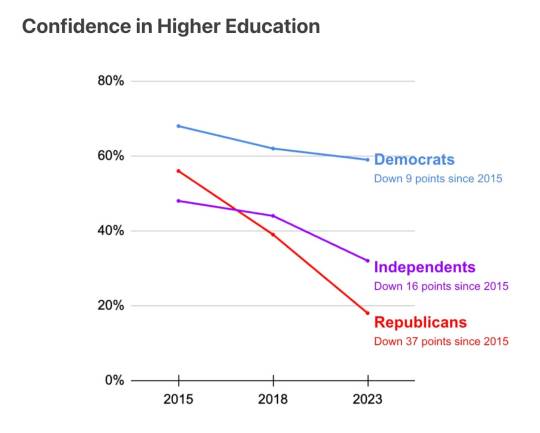
[ Figure 1. Percent of U.S. adults with "a great deal" or "quite a lot" of confidence in higher education. Source: Gallup (2023). ]
The good news is that the academy’s free fall is now over. American higher ed hit rock bottom on December 5, 2023 in that Congressional hearing room. Anyone who wants universities to bounce back and regain the trust of the American people must understand this new morality and ensure that it never holds sway on campus again.
The key chapter for understanding the new morality is chapter 3. I recently re-read that chapter and thought it would be of help to those who are struggling to comprehend the enormity of the culture change on so many campuses since 2015. Greg and I explained the transformation as the triumph of a cognitive distortion—binary thinking—such that students learn to slot everyone into one of two boxes: oppressor or victim.3 This mindset is the psychological basis of one of the three “Great Untruths” that we found flourishing on college campuses in the 2010s: Life is a battle between good people and evil people.4 We said that this was a terrible thing to teach students, and we explained why we expected that students who embraced this untruth would damage their mental health. (Subsequent research has confirmed this prediction.)
The central portion of the chapter describes two different kinds of identity politics, one of which is good because it actually achieves what it says it is trying to achieve, and because it brings both justice and, eventually, better relationships within the group. We called this “common humanity identity politics.” It’s what Martin Luther King, Jr., and Nelson Mandela did by humanizing their opponents and drawing larger circles that appealed to shared histories and identities. The other form we called “common enemy identity politics.” It teaches students to develop the oppressor/victim mindset and then change their societies by uniting disparate constituencies against a specific group of oppressors. This mindset spreads easily and rapidly because human minds evolved for tribalism. The mindset is hyper-activated on social media platforms that reward simple, moralistic, and sensational content with rapid sharing and high visibility.5 This mindset has long been evident in antisemitism emanating from the far right. In recent years it is increasingly driving antisemitism on the left, too.
Common enemy identity politics is arguably the worst way of thinking one could possibly teach to young people in a multi-ethnic democracy such as the United States. It is, of course, the ideological drive behind most genocides. On a more mundane level, it can in theory be used to create group cohesion on teams and in organizations, and yet the current academic version of it plunges organizations into eternal conflict and dysfunction. As long as this way of thinking is taught anywhere on campus, identity-based hatred will find fertile ground.
With permission from Penguin Press, Greg and I present a condensed version of chapter 3 in a linked post, here:
What is the victim-oppressor mindset and how did it conquer the academy?
Please do go read that post, and then come back here.
OK, if you don’t want to do that right now, here is the ending of the excerpt, which offers a partial summary. After describing the social psychology of tribalism and ideas about power (from Marx, Marcuse, Foucault, and Crenshaw), we analyze an intersectionalist text in which the author (Kathryn Pauly Morgan) asserted that because men created educational systems, girls and women in those systems today are essentially a “colonized population.” Here is our response:
Morgan is certainly right that it was mostly white males who set up the educational system and founded nearly all the universities in the United States. Most of those schools once excluded women and people of color. But does that mean that women and people of color should think of themselves as “colonized populations” today? Would doing so empower them, or would it encourage an external locus of control? Would it make them more or less likely to engage with their teachers and readings, work hard, and benefit from their time in school? More generally, what will happen to the thinking of students who are trained to see everything in terms of intersecting bipolar axes where one end of each axis is marked “privilege” and the other is “oppression”? Since “privilege” is defined as the “power to dominate” and cause “oppression,” these axes are inherently moral dimensions. The people on top are bad, and the people down below are good. This sort of teaching seems likely to encode the Untruth of Us Versus Them directly into students’ cognitive schemas: Life is a battle between good people and evil people. Furthermore, there is no escaping the conclusion as to who the evil people are. The main axes of oppression usually point to one intersectional address: straight white males. [...]
In short, as a result of our long evolution for tribal competition, the human mind readily does binary, us-versus-them thinking. If we want to create welcoming, inclusive communities, we should be doing everything we can to turn down the tribalism and turn up the sense of common humanity. Instead, some theoretical approaches used in universities today may be hyper-activating our ancient tribal tendencies, even if that was not the intention of the professor. Of course, some individuals truly are racist, sexist, and homophobic, and some institutions are too, even when the people who run them mean well, if they end up being less welcoming to members of some groups. We favor teaching students to recognize a variety of kinds of bigotry and bias as an essential step toward reducing them. Intersectionality can be taught skillfully, as Crenshaw does in her TED Talk. It can be used to promote compassion and reveal injustices not previously seen. Yet somehow, many college students today seem to be adopting a different version of intersectional thinking and are embracing the Untruth of Us Versus Them.
So, how well does our analysis from 2018 hold up in 2023? Does chapter 3 help us to understand the recent explosion of antisemitism on campus?
Unfortunately, the analysis works perfectly. Many students today talk about Israel as a “settler-colonialist” nation.6 That is straight oppressor/victim terminology, from post-colonialist thinker Frantz Fanon. It treats Israel as if diaspora Jews were 19th century England or France sending colonists to take over an existing society, motivated by monetary greed. Once that frame is applied, students’ minds are closed to any other understanding of a complicated situation, such as the view that Jews are the original (or indigenous) inhabitants of the land, who had a continual presence there for 3,000 years, and whose exiled populations (many in Arab lands) had nowhere else to go after being decimated by Hitler’s version of common enemy identity politics.7 The French in Algeria could return to France, but if these students get their wish and Hamas gains control of all the territory “from the river to the sea,” it’s not clear where seven million Jews would go, other than into the sea.8

[ Image. Pro-Palestinian supporters march after a rally in New York City, October 9, 2023. Photo by Lev Radin, Shutterstock. ]
Direct evidence of the link between the oppressor/victim mindset and antisemitism was published last week in a poll from Harvard’s Center for American Political Studies and the Harris Poll. The survey was fielded on December 13-14.9 The survey asks about Americans’ beliefs not just about Israel but about Jews in America and on campus as well. I’ll summarize a few of the items, which you can check out in the report, and I'll expand on three in particular, which document the wide reach of the oppressor/victim mindset and its role in causing young people to embrace antisemitism.10
The Harvard-Harris survey found that Americans side strongly with Israel against Hamas in the current conflict––except for Gen Z (here operationalized as the 18-24-year-old age bracket)11, which is evenly divided between support for Israel and Hamas. (See p. 47 of the report.)
I should note that some have rightly criticized the Harvard-Harris poll on methodological grounds, especially for forcing respondents into binary choices, rather than offering a “don’t know” or “undecided” option. When such options are offered many people choose them, sometimes more than half, so the numbers you’ll see below probably overstate the prevalence of antisemitism, in absolute terms. Zach Rausch and I have been collecting all the recent surveys we can find on attitudes toward the Gaza conflict in this Google doc. Many other surveys have confirmed that there is substantially more support for Hamas among Gen Z than among older generations, although some studies find that Gen Z still tilts slightly toward Israel. It is the pattern of responses across questions and generations that I am drawing on, rather than the absolute numbers.
The survey found that Gen Z is not much different than older generations in agreeing that 1. Antisemitism is prevalent on campus (p. 50), 2. Jewish students are facing harassment on campus (p. 50), 3. Calls for “the genocide of Jews” are hate speech (p. 51), and 4. Calls for “the genocide of Jews” are harassment (p. 52).
Yet, despite agreeing with other generations that antisemitism is prevalent on campus, that Jews are being harassed on campus, and that calls for genocide are both hate speech and harassment, Gen Z is evenly divided as to whether campus protesters have a right to call for genocide against Jews. You can see the exact question below the table in Figure 2. As you can see below, all older generations favor disciplinary action as the proper response to students who publicly call for the mass killing of Jews. Only Gen Z does not.

[ Figure 2. “If a student calls for the genocide of Jews should that student be told that they are free to call for genocide or should such students face actions for violating university rules?” Harvard-Harris Poll, December 2023, screenshot from p. 51, with additional annotations by Haidt. ]
Why is Gen Z so tolerant of hate speech and verbal harassment of Jews, when it shows the lowest tolerance for such speech against other groups? The next three items show that the oppressor/victim mindset and common enemy identity politics are at work, but only for Gen Z. One item asked “Do you think that identity politics based on race has come to dominate at our elite universities, or do they operate primarily on the basis of merit and accomplishments without regard to race?” (p. 55). All generations agree that identity politics based on race is now dominant, but Gen Z, which has the most experience with current campus culture, agrees more strongly (69%, tied with those over 65).
The big difference between generations is that only Gen Z endorses this kind of identity politics. One survey item asks: “There is an ideology that white people are oppressors and nonwhite people and people of certain groups have been oppressed and as a result should be favored today at universities and for employment. Do you support or oppose this ideology?” [p. 56]

[ Figure 3. “There is an ideology that white people are oppressors and nonwhite people and people of certain groups have been oppressed and as a result should be favored today at universities and for employment. Do you support or oppose this ideology?” Harvard-Harris Poll, December 2023. ]
Gen Z, and only Gen Z, agrees with the “ideology that white people are oppressors.” The direct line linking this explicit form of common enemy identity politics to antisemitism is found in the responses to the next item: “Do you think that Jews as a class are oppressors and should be treated as oppressors or is that a false ideology?”

[ Figure 4. “Do you think that Jews as a class are oppressors and should be treated as oppressors or is that a false ideology?” Harvard-Harris Poll, December 2023. ]
Gen Z, and only Gen Z, agrees. As I said earlier, the absolute numbers would be lower if a neutral or “don’t know” option were presented, so I do not believe that two out of every three Americans in that age range truly believes that Jews are oppressors. But even if half of the respondents chose a third option, the balance of those who believe it to those who reject it would still tilt toward “oppressors,” and more strongly than for any older generation.
In other words: While all generations agree that race-based identity politics now dominates on campus, only Gen Z leans toward (rather than away from ) endorsing such politics, applying it to Jews, and agreeing that we should treat Jews as oppressors—that is, treat them badly and not protect them from hate and harassment because they deserve what’s coming to them.
I should offer a few clarifications.
First, it is understandable that there is an age gradient, with older generations strongly pro-Israel and younger generations becoming increasingly supportive of the Palestinian cause. Older generations were raised by parents who remembered the Holocaust and understood the context within which the state of Israel was created. Older generations remember the frequent attacks on a vulnerable Israel in its early years. Younger generations, in contrast, have only known a strong Israel that occupied Palestinian territory (at least in the West Bank). There are two sides on this issue. I’m on one side, but I understand that there are good reasons for taking the other side. Opposing Israel or hating the Israeli government is not automatically anti-semitism. What concerns me is that anti-Israel sentiment seems to be increasingly closely linked to hatred of Jews and physical attacks on Jews and Jewish sites. Such attacks may seem morally justified, even virtuous, to those who believe that Jews are “oppressors.”
Second, the Israeli military response has not been “surgical”; its bombing campaign has killed thousands of Palestinians who are not members of Hamas. Young people, most of whom are on TikTok, are probably more exposed than older people to videos of horrific suffering among Gazans. So again, I don’t criticize anyone for protesting Israel or the war, and I hope that universities respect pro-Palestinian students’ First Amendment rights to speak and protest. But the displays of support for Hamas began even before Israel had responded, and part of what was so shocking in the first week after the October 7 attack was the relatively muted and delayed expressions of concern by university leaders and campus organizations. Whatever has caused today’s campus antisemitism, it was already baked in before Israel’s military response began.
Third, I cannot say how much of today’s antisemitism comes from college classrooms (and K-12 classrooms as well), and how much is driven by social media, particularly TikTok. The rapid transition to the “phone-based childhood” that happened around 2012 is a crucial part of the story, which Greg and I discussed in The Coddling. As I have argued elsewhere, social media has introduced dangerous new dynamics into society, including explosive virality and the fragmentation of shared understandings (i.e., the collapse of the Tower of Babel). But given that today’s campus antisemitism is so closely linked with the oppressor/victim mindset, and given that Greg and I (and many others) have been warning about the dangers of teaching this mindset since before TikTok was created, I am confident that American higher education bears a substantial portion of the blame.
I do not believe that those three presidents, testifying before Congress, were antisemitic in their hearts. But in their heartless and gutless responses to a question about when it violates their campus’s rules for students to call for genocide against Jews, all three presidents validated the now-prevalent campus antisemitism. All three presidents essentially said: Jews don’t count, it’s OK to call for their deaths, as long as it does not “turn into action.”
According to those who embrace common enemy identity politics and its oppressor/victim mindset, all members of victim groups are justified in “punching up,” pulling oppressors down, vandalizing their buildings and symbols, and perhaps even raping their women and killing their children. At least, that is the implication of tweets from various professors who praised the Hamas attack, saying versions of “this is what decolonization looks like.”
Conclusion
In the tweet I quoted at the top of this essay, David Frum pointed out that elite college campuses have diverged from the rest of the country. Frum urged those of us in the academy to reflect upon why college campuses are so rife with antisemitism, in a country that is, according to public opinion data, very positive toward its Jewish citizens. I have tried to do that in this essay, concluding that it is our own fault for embracing and institutionalizing bad ideas, rather than challenging them. I have shown a direct connection between the oppressor/victim mindset and the willingness of many in the current generation of students to espouse overtly antisemitic beliefs (even if it is not truly a majority of them).
American higher education is now in a code-red situation. It’s not just Jewish donors and alumni who are withdrawing their support. As you saw in Figure 1, a majority of Americans had low confidence in higher ed before October 7. In the wake of the December 5 congressional hearings, it is now surely a supermajority, including perhaps most Democrats as well. Efforts in red-state legislatures to constrain, control, or defund higher ed will now find a great deal more public support than anyone could have imagined before 2015.
If they are to regain public trust, university leaders will need to understand the victim/oppressor mindset and how their own institutions are encouraging it. Then they will need to take bold action and make deep changes. You can’t just plant a new center for the study of antisemitism in soil that is ideal for the growth of antisemitism. You have to change the soil, change the culture and policies of the institution.
Greg and I have an entire chapter (13) on how to do that, how to create “wiser universities” by enshrining free inquiry, changing the standards used to hire faculty and admit students, and then orienting students for productive disagreement. A wiser university would make students less susceptible to the oppressor/victim mindset even if they are exposed to it in a few of their classes. I will offer many more ideas in future posts. For now, I list organizations that specialize in improving the culture of universities, and I list essays that offer what I think are good ideas. I’ll keep the list updated for a while, so if you find good essays, please post links to them in the comments.
I close this essay with the quotation that opens Chapter 3 of The Coddling, from Rabbi Jonathan Sacks, one of the wisest people I’ve ever had the good fortune to meet:
There is the moral dualism that sees good and evil as instincts within us between which we must choose. But there is also what I will call pathological dualism that sees humanity itself as radically... divided into the unimpeachably good and the irredeemably bad. You are either one or the other.
Universities can and must free students from pathological dualism.
#Jonathan Haidt#The Coddling of the American Mind#antisemitism#oppressor vs oppressed#oppressor#oppressed#oppression#pathological dualism#dualism#intersectionality#postcolonial theory#postcolonialism#colonialism#academic fraud#Hamas supporters#terrorism supporters#pro hamas#palestine#israel#pro palestine#free palestine#islamic terrorism#academic corruption#ideological capture#ideological corruption#religion is a mental illness
25 notes
·
View notes
Text
The book: https://amzn.to/3CX9aWM
#if books could kill#books podcast#the coddling of the american mind#michael hobbes#peter shamshiri#Spotify
10 notes
·
View notes
Text
I just started reading The Coddling of the American Mind and this is only from the introduction to the spanish version
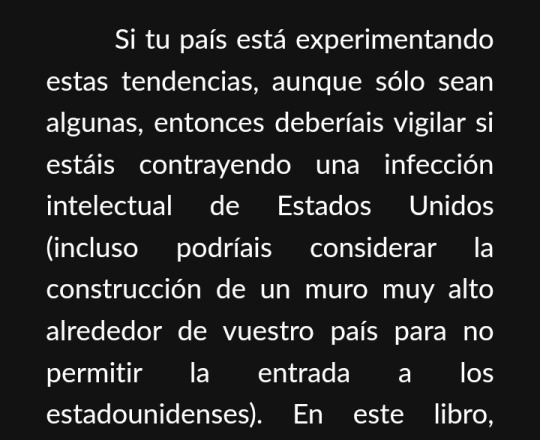
English translation: If your country is experiencing these trends, even just a few, then you should be vigilant about getting an intellectual infection from the United States (you might even consider building a very tall wall around your country to ban people from the U.S)
AND GIVEN THE RECENT EVENTS I think it's not a bad piece of advice
2 notes
·
View notes
Text
Letting Gender Acolytes Reshape University Curriculum - WTAF?
Letting Gender Acolytes Reshape University Curriculum – WTAF?
The loonery that is going on in the United States is really getting out of hand. This article does contain some good news as a Professor of Education has managed to keep her job despite stating the ‘heretical’ fact that human beings are sexually dimorphic species.
Let that one sink in a bit as you contemplate your stance on ‘woke politics’. Especially if you happen to believe that the woke…
View On WordPress
#Education#Faux Progressive Witchhunts#Find the Heretic#The Coddling of the American Mind#University of Southern Maine
0 notes
Text
"Zoro had no friends besides kuina" are johnny and yosaku just chopped liver??? Also any time we see zoro on his own, it's very obvious that he's good at making friends with literally anyone. Y'all don't understand Zoro. You're so desperate to find emo things about him that you make stuff up and completely ignore that he's very emotional and open and expressive in canon all on his own. Y'all just aren't used to seeing someone who regulates their emotions, express emotion.
#everyone wants them to throw huge fits#and whatever#or else theyre not multidimensional enough#and completely ignore that multidimensional ppl come in all types#yall rlly need to study some Buddhism and taoism#no wonder americans are so dramatic and obnoxios#yall have no clue how to regulate your spirit or practice mindfulness or center yourself etc#all you know is loud screaming and yelling and crying and performances so#mama bird will hear you and coddle your emotions#you perform so outwardly so that other ppl will sooth you#you have no emotional strength to soothe yourself or regulate your own emotions#none of you understand zoro bc youre not on his level#srry
10 notes
·
View notes
Text
You already know who I'm complaining about but the white dude from tiktok has been blocking any Natives trying to educate him, and I notice he NEVER interacts with any ndns correcting him on misinformation he says about us, no liked comment, no reply, nothing

#yeah when you profess to 'love' Native American 'culture' but literally cry on camera & ignore ndns who tell you#that youve crossed a line or you beed to be mindful of your content. theres a word for that.#fuck everyone who's coddling him too. hes not a 'kid' hes a grown man#and I KNOW if he wasn't White and European ppl wouldnt love him & excuse his bullshit this much#why are we centering him about how hes SooOOo heartbroken about Native racism & learning about ndns?#he is literally not the only moniyaw learning about ndns why him. why.#** that you BE findful ugh
27 notes
·
View notes
Text
The abduction and murder of a child by a stranger is among the most horrific crimes one can imagine. It is also, thankfully, among the rarest. According to the FBI, almost 90% of the children who go missing have either miscommunicated their plans, misunderstood directions, or run away from home or forster care, and 99.8% of the time, missing children come home. The vast majority of those who are abducted are taken by a biological parent who does not have custody; the number of children reported missing - roughly one hundred children in a nation with more than 70 millions minors. And since the 1990s, the rates of all crimes against children have gone down, while the chances of a kidnapped child surviving the ordeal have gone up.
2 notes
·
View notes
Text
Joyful Outlook
I’ve been making joy in my life, recently. I have always tried for this, and there’s been seasons it was a lot harder to do than others. This one? It’s pretty easy, to be honest. The sun is shining, as it is more days than not here in Texas. Sure, it’s hot out there, but it’s comfortable inside. I can look out my office window and watch my husband sitting comfortably and reading in the shade. My…
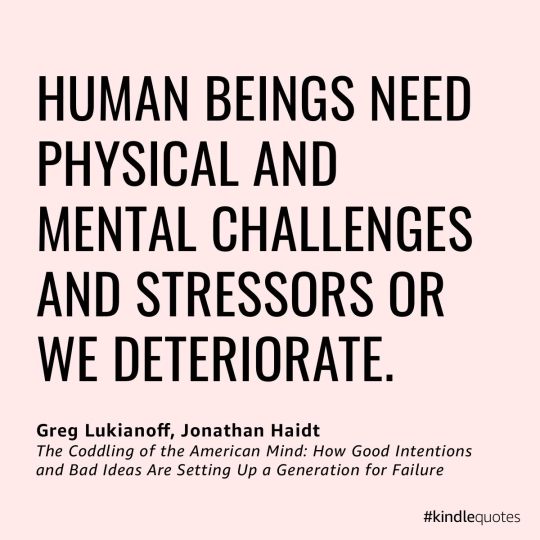
View On WordPress
#a hopeful outlook#book discussion#Book Reviews#coddling of the american mind#First Frontier#joy of living#Madness and Memory#making joy#reading
2 notes
·
View notes
Text
it’s also a little insane seeing firsthand how it feels like so many adults 25+ are SO immature. And this shows in their arguments and ways they phrase things? idk how to explain it.
I don’t know if it’s just rampant internet use or the fact that they’re nostalgic disney kids but it’s really tiresome when you read a really good argument and responses to that post are so black-and-white, without a semblance of critical thinking. Usually just repeated mantras or ’fuck you’
So many posts I’m like ”what 14 year old wrote this?” and then I check the blog and the author is 30.
#I don’t know how to explain this#Am I losing my mind? Or are so many of my generation acting like small children well into their 20s and 30s?#American young adults are so coddled#Treated like teenagers#When are we going to grow up?
2 notes
·
View notes
Text
Words change meaning - another example.
@tartapplesauce reblogged my (long) post about Dublin coddle, which mentioned a weird version called "New World Coddle" using chorizo and squash.
TBH, my Mind Palate suggests it would taste quite good, but it's so far from traditional or even well-tweaked-traditional coddle that it's not coddle any more, and should have a different name entirely, possibly in Latin American Spanish.
Also TBH I've already amended the recipe thrice in my head, (1) chipotle powder not smoked paprika; (2) finish with a scatter of toasted pine-nuts; (3) restore the chickpeas mentioned in the Method to the Ingredients where they'd been forgotten.
I've already admitted to breaking the Dublin coddle rules by browning things, so all bets are off. :->

(BTW, this wasn't ours; @dduane's spine and hip have been rather a trial this past couple of days, so we just took things easy and let the Ibuprofen do its thing.)
Re. coffee mornings, what about various tea-breads, fruit sodas, barm brack etc.? Those could be made either trad or tweaked-trad, and though I'm not sure how they could be made "dainty" like petits-fours and so on, I bet it could be done.
*****
As for the changed-meaning word (getting there eventually) it's "notions" and @tartapplesauce added this link.
"To have notions" in Ireland is to think highly of yourself, often without justification - though if the justification is, er, justified, "begrudgery" will often follow. I've encountered "begrudgery" before, but this version of "notions" is a new one.
I have, however, experienced the Northern Ireland - or maybe just my family - version, which is "don't put yourself forward". This is a bad notion to have when thinking about author profile and book publicity and as DD can confirm, it took me far too long to shake it off.
On the flip-side, having notions can mean thinking outside the box, being imaginative, boldly going where no-one has gone before...
Um, got a bit carried away there... Right to the NYT bestseller list, in fact. Twice. ;->
*****
Neither of those are MY usual meaning.
Whenever I use "I have a notion", either said or written in a post, it's either "I have a thought" with the thinking-intensity dialled down a few notches, or "I have a vague memory of", otherwise known as IIRC or AFAIK.
And the other OTHER meaning of "notions", the one I first thought of (maybe with notions of food already in mind) was this:

That book was published in 1890, and the title, translated from Victorian English, is something like "Tips and Tricks" or, in more modern English, "Household Hacks".
There's nothing derogatory about it.
*****
DD and I have both posted about Mrs de Salis in the past; all her books are what's usually referred to as "slim volumes". Here are six of them alongside Mrs Beeton's doorstopper:

I inherited a copy of "Savouries a la Mode" from Mum, who inherited it from Granny, and we've made several things from it, all of which worked - though far and away the best so far are the Parmesan Biscuits, which are...
Well, "more-ish" is a good start, though it doesn't hint at the underlying desire to get in there with both hands...
tumblr
Here:


All of Mrs de Salis's books are Public Domain, and while we intend eventually to have a full collection of the Slim Volumes, they're also available as PDFs here.
I have a notion that anyone reading this Tumblr will like them... ;->
#food and drink#linguistics#notions#word meaning changes#Dublin coddle#Mrs de Salis#Victorian cookbooks#parmesan cookies
61 notes
·
View notes
Text
youtube
Author issues stark warning over cancel culture - ‘We’ll be studying it in 100 years!’
John Cleese: I'm so grateful that you came. Greg Lukianoff has co-written the best book on this subject that I've read. You co-wrote it with Jonathan Haidt, wonderful author. It's called "The Coddling of the American Mind," and it's the most interesting thing I've read on all this stuff.
But what I'm fascinated by, is that it all started with you having a severe depression. So, tell the tale.
Greg Lukianoff: Well, in 2007 I got so depressed I had to be hospitalized as a danger to myself. And in the process of recovering the next year, I studied Cognitive Behavioral Therapy. And Cognitive Behavioral Therapy is something that teaches you to talk back to your own exaggerated thoughts.
Cleese: So, when you have the voices in your head you argue with them?
Lukianoff: Exactly. When you're catastrophizing, you call it out…
Cleese: So catastrophizing means what?
Lukianoff: That you're just thinking everything's going to be a catastrophe. It sounds very much like it sounds. When people are anxious and depressed, they have all of these cognitive distortions you know at Volume 11 going on in their head. And that just getting in the habit of talking back to them can relieve many of the symptoms of anxiety and depression.
Cleese: So, when you discovered that, what happened then?
Lukianoff: Well, you know, it changed my life, but I started seeing all over the place ways in which we were teaching young people the habits of anxious and depressed people. It was as if, both in K through 12, in grade school and in higher education, it was like the adults were saying, by the way do catastrophize, do engage in emotional reasoning, do engage in binary thinking, which I know you think a lot about as well.
Cleese: So, you linked up with Jon?
Lukianoff: I linked up with Jon Haidt, I told him what I thought was -- cause I'm a constitutional lawyer. My major focus…
Cleese: Are you? I thought I liked you.
Lukianoff: … and I was defending freedom of speech on college campuses, and academic freedom, and I noticed around 2013 that students were really clamping down, both on freedom of speech, but they were also rationalizing it in this kind of medicalized way that was all catastrophizing, all binary thinking, all of these cognitive distortions. So, we wrote an article together in 2015, saying the things that are threatening free speech on campus are also the kind of mental habits that will make young people anxious and depressed.
Essentially, it's teaching people that essentially, they should avoid challenges, they should avoid things that cause them any pain, but of course and things that cause you pain are also what cause you growth. And so, the emphasis on having your children not experience either physical or emotional pain or challenges, is actually a profoundly unhealthy way to teach kids to think about the world, and to let them be kids and grow up. It's tempting as a parent, because I have a five and a seven-year-old, I understand that you want to protect your kids from emotional difficulty, but if you don't prepare them for a world that's difficult, and you don't prare them for challenges, you're not preparing them to be adults. And even worse. you're creating a situation where of course they're going to be anxious and depressed, because they're afraid of the world, they're afraid of adulthood.
Cleese: Having all these insights with you, how do they affect the people who are advocating woke ideas?
Lukianoff: I think that to a degree, this terrible advice is inherent to a lot of what we might call woke ideology. That essentially, challenge is bad, that you should always follow your emotions, and most importantly, that life is a battle between good people and evil people. A lot of the ideology that we're seeing particularly on campuses, is this very simple narrative of there is pure good and pure evil, and you want to be on the side of pure good always at war with the other.
Cleese: So that if you agree with a lot of the transgender agenda but disagree with some of it, then you are a very bad…
Lukianoff: You're absolutely evil.
Cleese: … person and you're absolutely wrong.
Lukianoff: Yeah, and this is part of the way that unfortunately, in the places where we should be learning to argue like adults, we're teaching this very childish way of arguing. It creates the situation where you can just dismiss any person, any book, any thinker, any institution you disagree with, because since you can find everything is evil, anytime you don't want to listen to somebody, you just declare them evil and…
Cleese: You don't have to bother with them.
Lukianoff: You don't have to challenge your thinking at all.
Cleese: Now, I want to ask you a little bit more about cancel culture, because every time I get on television, the second question is something to do with cancel culture, and my friends are saying, why are you always talking about cancel culture. And the answer is, we're obsessed with it. Tell me what you're thinking about it.
Lukianoff: So, I have a book coming out called "Cancelling of the American Mind."
Cleese: Cancelling, yes.
Lukianoff: Yes, and it's making the point that not only is cancel culture real, but it's so bad we're going to be studying it in 100 years. One thing that we've collected is the number of professors who have been punished or fired. And in the United States, you have to go back to the 1950s to McCarthyism to see numbers that are anywhere near as close to the number of professors…
Cleese: What? The McCarthyism?
Lukianoff: In terms of numbers, absolutely. The estimate's about about 100 to 150 professors were fired from 1947 to 1957. And right now, we're approaching 200 professors getting fired.
Cleese: How does it happen? The students?
Lukianoff: Used to be the administrators were the ones getting professors in trouble. And then it increasingly became the students and the fellow professors who were reporting them. So, McCarthyism, it was generally people outside of higher education who were reporting professors. But now it's coming from within, and it's devastating for the production of knowledge. Because if people think -- people aren't stupid. If they look at an expert, and they come up with an opinion, and they say to themselves, "wait a second, if you can be cancelled for having the wrong opinion, why should I trust you to be objective about this anyway?"
Cleese: Is it anything to do with the fact that the fees at universities now are so high that the students are also kind of customers as well as students?
Lukianoff: That is part of the problem.
Cleese: And they don't want to lose their customers, right?
Lukianoff: It's related to the fees both because it creates a "customer is always right" situation, but also because those fees, at least in the states, increasingly pay for armies and armies, ever growing numbers of bureaucrats and administrators who enforce really rigid ideological norms. They police freedom of speech and it creates an environment that is very chilled.
Cleese: Because the only real aim they have in life is not to get fired.
Lukianoff: Careerism definitely plays a part, but there's also people who think that the key to saving the world is less and less freedom of speech. You would think we would have learned a bit from Galileo.
#John Cleese#The Dinosaur Hour#Greg Lukianoff#The Coddling of the American Mind#Cancelling of the American Mind#cancel culture#academic corruption#cognitive distortions#cognitive behavioral therapy#woke ideology
7 notes
·
View notes
Note
do you perhaps have some headcanons about mr. isagi? <3
OFC!! <3333
on top of having 2.0 vision (and well, metavision) his VVIQ score is a perfect 5
this helps him a lot with art and he's actually pretty good at it even though he's not as passionate about it as he is with football/soccer
he started drawing through doodling his favourite manga characters and he's able to recreate art styles almost perfectly
he's actually pretty careless when it comes to his schoolwork (esp for STEM) so sometimes he'll hand in incomplete work bc it looks like he's already filled in certain questions
like no. you doodled an eye instead of solving for "x"
he canonically hates science, but if he had to choose one branch as his favourite, it would be chemistry (not boring & derivative memorization like bio but not absolutely insane like physics)
something might contradict this in canon but i hc his handwriting is pretty shitty lmao
since so many sports anime characters look like him (nanase haruka, kageyama tobio, etc) i like to pretend they're all cousins and they meet up at family reunions to compete to see who's better at their respective sport
so yeah despite having no siblings he has a shit ton of cousins who he's really close to
he was conceived by accident 💀 his parents love and coddle him despite this
despite showing the exact opposite of the typical symptoms (great spacial awareness, scarily good empathy, etc) i still say he's got autism lmao. he just has a really unique type yk
his hobby is canonically walking, but i wanna expand on this a little bit
he somehow doesn't listen to music on his walks
(in fact, he doesn't listen to much music at all. that's why his fav song is from a commercial 💀)
furthermore, he rarely ever brings his phone out on walks at all. he likes being at one with his surroundings and he doesn't want his phone to distract him
which is understandable. unless we're talking about how he'll sometimes walk 2+ hours to go to a friends house AND HE DOESN'T HAVE IT?? NO GPS??? NO MAP NOTHING
he's just spent so much time walking around saitama he has a map of most of it installed in his mind
he really doesn't use his phone much at all. he has a few accounts in case he wants to check something out, but he doesn't post anything + barely follows anyone + even has a blank pfp on everything
he apparently received 0 valentine's chocolates in the previous year, but a few ppl from school had a crush on him
he's not popular or anything but some ppl over the years thought he was a genuinely sweet guy and quietly observed him from a distance
he's completely oblivious to this
his school friends all have way more romantic experience than him and they all tease him for this
he gets really frustrated about this and tries to convince himself he likes certain ppl in hopes of something sticking
when he genuinely likes someone he's oblivious to this too lmaoo
he's the type of guy to take dodgeball in PE wayyy too seriously
the first time he swore was when he was eight and got mad at his teammates for slacking off
he got in trouble for this and never swore in front of an adult ever again
(the lack of any physical adults in blue lock made him fall back on his foul mouth)
his fav class is PE in canon but i think i remember something about isagi hating baseball? that might have just been someone else's hc but yeah
he enjoys basketball and badminton, but he thinks volleyball is mid
the one time his school tried floor hockey he enjoyed it well enough
american football is just way too confusing for him
he had no backup plans in case football/soccer didn't work out, but he'd be fantastic in psychology and/or politics
#i got more thoughts but i forgor 💀#blue lock#bllk#asks#isagi yoichi#yoichi isagi#bllk isagi#bllk isagi yoichi#bllk yoichi isagi
36 notes
·
View notes
Text
I don’t think it’s discussed enough how american and euro “leftists” (mostly tankies but also quite a few seriously uninformed libs) heavily romanticise latin american leaders and present them as “nicer” (read: rural simple-minded folksy grandfatherly types, which sounds insultingly close to romantic primitivism) men who are contrasts to the ugly, greedy (((capitalist-globalist))) oppressor westerners, and it plays into their stupid static idea of latin america being this one homogenous blob of rustic cuteness threatened by evil amerikkka looming over it from the north.
Fam, the “nice socialist” men you stan are corrupt as hell and do not present any meaningful progress aside from populist optics. They supposedly champion the common poor while their children are coddled nepo babies enjoying luxuries worth millions in usd as well and foreign boarding schools. Even bolsonaro is not seen as bad enough compared to, say, macron, when we had a brazilian tankie saying “brazilian nationalism isn’t bad because it’s not western” and ofc ppl like her only interact with westerners instead of other latin americans
197 notes
·
View notes
Text

SUN ON THE CUL-DE-SAC
DILF!Phillip Graves x Female Reader
ONE SHOT || MDNI
PRONOUNS USED: She/Her/Hers
DISCLAIMER: I do not own the canon character of Phillip Graves or any of the canon characters or canon lore of the games.
CW: DILF!AU, slight age gap! ( reader is set to be in her early to mid twenties and Phillip would be his canonical age) mutual pining, exhibitionism, kissing, cursing, praising, mentions of alcohol (nobody included in the story drinks!) male receiving oral, face fucking.
Author's Note: Based upon the existing headcanons about DILF!Phillip Graves contributed by the fandom, the concept is not something out of my original writings! I do not condone the actions or behaviors of Phillip, this was made just for fun! Enjoy!
Cul-de-sac.
The word hits the tip of the tongue three times only for its definition to plainly be "bottom of the sack."
A phrase that the young woman thought perfectly embodied what it was like to exist in the small town. A blur of endless birthday parties, summer picnics, and mediocre thanksgiving dinners with the same old neighbors who spent their time gossiping on who or what they saw in passing at the grocery store.
Perhaps, she had nobody else to blame for her unhappiness but herself. Nobody was forcing her to stay and why wouldn't she? The house was reasonably priced, the area was safe, work was a car ride away.
Safety, security and stability.
The American dream was right outside her doorstep.
And when the summer crept in, it was now moved right next door.
On the third day of the heat wave that plagued the neighborhood, the idea of staying inside and being overstimulated by the buzzing sound of the air conditioner and the heaviness of her clothes against her body brought dread to the young woman.
The sound of sprinklers being timely turned on with the droplets of water hitting the soft green grass inspired her to stroll to the back porch with a cold water bottle in hand accompanied by a small stack of books in the other.
She opened the screen door, revealing the bursts of greenery and white iron lawn furniture that decorated the backyard. The summer heat pooled around her, the rays of sunlight that kissed her exposed navel made their way to the peaks of her breasts that were being held together by the dainty terry cloth string of her canary yellow bikini.
In the middle of the wildflower and clotheslines riddled backyard she sunbathed away, lounged on-top of the plush chaise chair and lost in her own little world of fictional romances and written angsts.
Chapter three of her drugstore romance novel was interrupted by the sound of a low whistle, the deep decibels caused her to prop up her sunglasses.
Leaning against the wooden face, standing at 5'10, was her neighbor Phillip Graves. He was almost unrecognizable without the droves of lonely and desperate housewives that coddled him in bites of their homemade apple pies and lingering french tip touches.
Phillip was a very handsome man, the kind of handsome that made people treat him differently. The dads of the cul-de-sac always gave Phillip top priority when it came to fourth of july barbeques, the mothers making sure to send over casseroles and inviting him over as soon as their husbands went to work, the children looked up to commander Graves as a true American hero.
His ego never got to the best of him however, despite all the attention he attracted. His attention always fell upon the young woman that lived next door, his scarred hands lingered on the small of her back when they greeted one another at gatherings, throwing winks and gazes at her when everybody else fell into their mindless chatter.
She never minded the extra attention. In fact, she played into it as much as she humanely could. She had grown into the nasty habit of leaving her curtains wide open towards his blue shuttered home, inviting his gaze in to witness her walking around her house wearing her shortest skirts with no underwear, bending and flexing over to expose her puffy cunt tucked between her supple thighs.
He wanted her as much as she did him.
There she laid, glossy with tanning oil, kissable lips lustrous with droplets of water and tied together with a pale yellow ribbon
A lewd illustration out of one of his fantasies.
"Enjoying the summer heat too?" She foxily asked, putting her book to the side while looking onto Phillip's lust hooded eyes.
He chuckled, "Sure. I'm just admiring your rose bushes." He boyishly commented. "I was just cleaning up a bit before the barbeque tonight. You're still welcome to come by the way." His baby blue orbs followed her form as she dainty walked over towards him, the two now standing mere inches away from each other.
"I'll pass, thank you. I don't think I'd stand a chance against the queen bees of the P.T.A" She giggled, the corners of her mouth curling in mischief.
Phillip bit his lip at seeing how ecstatic she had turned around him, he wished nothing more than to revel in her essence.
"I'm pretty sure it would be the other way around sweetheart."
The nickname caused her heart to skip a beat, it was the type of material she would use to moan his name against the bathroom walls while touching herself to the idea of him.
The pregnant pause between them was filled with the sharp shrill of a cicada singing high up above the two.
A pair of manicured fingers gently laid upon his wrist, "You mind if I come over for a beer? I'm assuming it's already being chilled in the cooler." She purred.
His large hand took her fingers, "Of course."
'How could he say no?' he thought.
In a matter of minutes, a kaleidoscope of sweet cherry chapstick and the bitter notes of mint swatched on the palettes of their tongues.
"You're an angel." He breathed out in between kisses, humming in red hot delight at her hand palming the bulk between his legs.
"I can show you how much of an angel I could be." She hushed out, looking at his calloused fingers plucking away the string of her top.
"On your knees."
The words fell on her ears as a soft demand, a gentle plea to the siren in front of him to crawl at his will. The sunburnt skin of her knees stinged against the cool tiles of the kitchen floor as she nestled in front of his massive form, her rose petal soft face now juxtaposing the erection that was vulgarly throbbing beneath his pants.
Hypnotized, Phillip watched in unwavering movement at how she pulled and tugged away at the layers of his leather belt and cotton to reveal the long and pink nature of his cock that curved upwards, angry and weeping with beads of pre-cum. The rosy pair of lips haloed around his bloated tip, sloppily placing warm and wet kisses. His hand ran through her lustrous hair, pleasure and agony running up and down his back to the rooks of his shoulder blades.
Each bob of her head brought him further and further into the wet crevasse of her mouth, every movement earning a low groan and high whine.
"Atta girl." He praised out at his tip hitting the back of her throat, his hips began to buck against her pretty face. She looked through wet and willing eyes as he chased his high, visions of pinks and swollen reds blanketed her cheeks and the full of her pout.
"Fuck. Fuck. Fuck."
The explicit chants, whimpers and swishing of her saliva coating the entirety of his length brought her pussy to a weep, feeling how her slick coated her exterior and down to the cup of her ass.
The destructive rhythm of his hips came to an abrupt halt as the veins that ran on every inch of his dick protruded and ached, spurts of hot white cum filled the opening of her mouth as he twitched and rocked out his climax.
His large hands clamping down on her chest, bracing himself with the pleasure that burned his aura.
Phillip pulled away, dusted in exhaustion and sweat.
A deep grumble of victory expelled from his chest while looking down at his girl, cherry red with tears at the corner of her eyes and swathed with brine white
He cupped her cheeks, placing the kiss of a bee on her destroyed lips.
She pressed herself into his, running her finger across the scar deeply embedded in his cheek, pensive in what the summer now held.
#phillip graves#phillip graves x reader#commander phillip graves#call of duty mw2#mw2 fanfic#fanfic#mw2 smut#oneshot#just for fun#phillip graves smut#my writing
128 notes
·
View notes
Text
The Democrats controlled the House of Representatives for about sixty years, with only brief interruptions in the mid-to late twentieth century, but their dominance ended in 1994, when the Republicans swept to victory under Newt Gingrich, who became Speaker of the House. Gingrich then imposed a set of reforms intended to discourage his many new members from forging the sort of personal relationships across party lines that had been normal in previous decades. For example, Gingrich changed the work schedule to ensure that all business was done midweek, and then he encouraged his members not to move their families from their home districts, and instead fly to Washington for a few days each week. Gingrich wanted a more cohesive and combative Republican team, and he got it.
The more combative norms then filtered up to the Senate as well (though in weaker form). With control shifting back and forth several times since 1995, and with so much at stake with each shift, norms of civility and possibilities for bipartisanship have nearly disappeared. As political scientists Steven Levitsky and Daniel Ziblatt put it, “Parties [have] come to view each other not as legitimate rivals but as dangerous enemies. Losing ceases to be an accepted part of the political process and instead becomes a catastrophe.”
(...) to produce a very unfortunate change in the dynamics of American politics, which political scientists call negative partisanship. In a recent review of data on “affective polarization” (the degree to which members of each party feel negatively toward the other party), Iyengar and Krupenkin summarize the change like this: Prior to the era of polarization, ingroup favoritism, that is, partisans’ enthusiasm for their party or candidate, was the driving force behind political participation. More recently, however, it is hostility toward the out-party that makes people more inclined to participate.
In other words, Americans are now motivated to leave their couches to take part in political action not by love for their party’s candidate but by hatred of the other party’s candidate. Negative partisanship means that American politics is driven less by hope and more by the Untruth of Us Versus Them. “They” must be stopped, at all costs. This is an essential part of our story. Americans now bear such animosity toward one another that it’s almost as if many are holding up signs saying, “Please tell me something horrible about the other side, I’ll believe anything!” Americans are now easily exploitable, and a large network of profit-driven media sites, political entrepreneurs, and foreign intelligence agencies are taking advantage of this vulnerability.
2 notes
·
View notes
Text
The like fandom idea that Jason became a problem child in order to make Dick the golden child are kind of wild. Because like... read the golden and silver age comics. Dick is the golden child. He is the most coddled and adored batkid purely by the metric of writers used to want Batman to be a hero and a good man plus it’s forty years of Dick being the only kid that exists. Bruce will never ever again be caring a child to bed when they fell asleep studying or making a whole day planned around their birthday or putting off a case to take them out to the beach house for a weekend or crying his eyes out as they go off to college. Like none of those traditional fatherly things are gonna happen because that Bruce is dead the writers made sure of it. Now he’s far more likely to clock one of his kids in the face then start a pillow fight.
Read the two years of Jason comics. He started off the bat in reboot as a problem child. You have a little thief stealing tires and smoking? Not supposed to be your all around good american boy like Dick Grayson was. (I say this as a Roma person, Devin Grayson included that Dick is Romani for purely racist reasons it was not always intended in canon and I do not see Dick as representation. If you are Roma and want to go for it. But if I read one more google translated story of Dick speaking Romanian for some god forsaken reason I’ll break my laptop)
Think about the world in which they were made. The 1980s were not in need of the same boy wonder as the 1940s. Robin was supposed to be what saved Jason from delinquency. And in the end the writers had him unable to be saved. He became aggressive against people like the Black Mask. The age old did Jason push that guy or watch him fall and does it even matter if he just watched because Batman and old Robin would have jumped after him so what is Jason’s deal? On to the end of his life with running away to find his birth mother and happening to run into Bruce who was looking for a nuke. Jason died in the end a hero to save his mom true but it is made clear in the narrative it was his own fault for not listening to his dad.
^ All of that written of course by a known hater of Robin who wanted to kill the symbol but couldn’t have touched Dick Grayson a far too beloved character. And like I said the 1980s. ‘Listen to your parents or you’ll be in trouble punk’ is not a crazy far out there narrative for them to have spun.
Back onto Dick he was made to make the little boys of America feel good about themselves like they could do anything. He listened to his dad and he was a stand up citizen who was all about justice! Go to the 1960s when he goes off to college. The first thing he does is get involved with a protest. He was calling Bruce up asking him to host a Beatles knock off in Wayne Manor. Bruce was always telling him to worry about his studies. That was what their first big fight was about! Bruce even explicitly tells Dick at one point to worry about himself and the Titans more than him ! The era a character is written in is reflective of the message they send and with time passed it is easier to look back and contextualize what the message was. Like modern day comic writers since Jason have been trying so fucking hard to ruin Dick and Bruce’s relationship but outright changing canon so that Bruce was a worse person in every argument. It’s not even funny at this point like every year down to the fucking weeks of Dick Grayson’s child hood was written out in succession and these modern writers are like we get it we do But what if Bruce also didn’t care about Dick. Like where am I???
The solution to Bruce Wayne and Batman not being a very good person is obviously in their minds make Bruce a horrible dad to Dick that way it evens out his shit behavior across the board. If there is no glaring example of how good Bruce has and could be then no one would think he should be like that. So we’re supposed to just nod along and be like Yeah i think Bruce would beat Jason up and smack Tim around and tell Damian he doesn’t like him. Seems fair to me. Which???
Anyways all this to say. Dick Grayson was always the golden child the writers just want you to forget Bruce was a good dad once.
168 notes
·
View notes